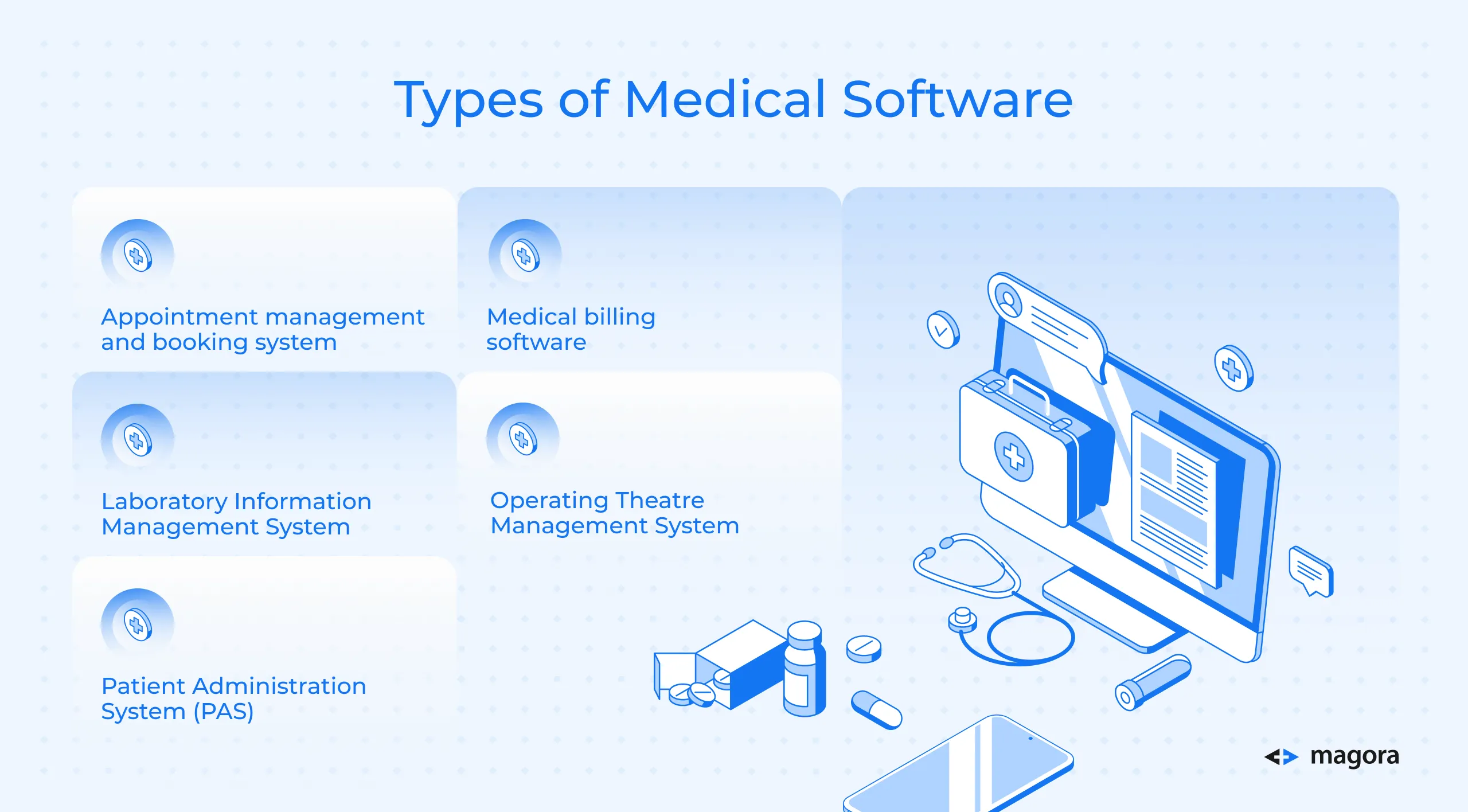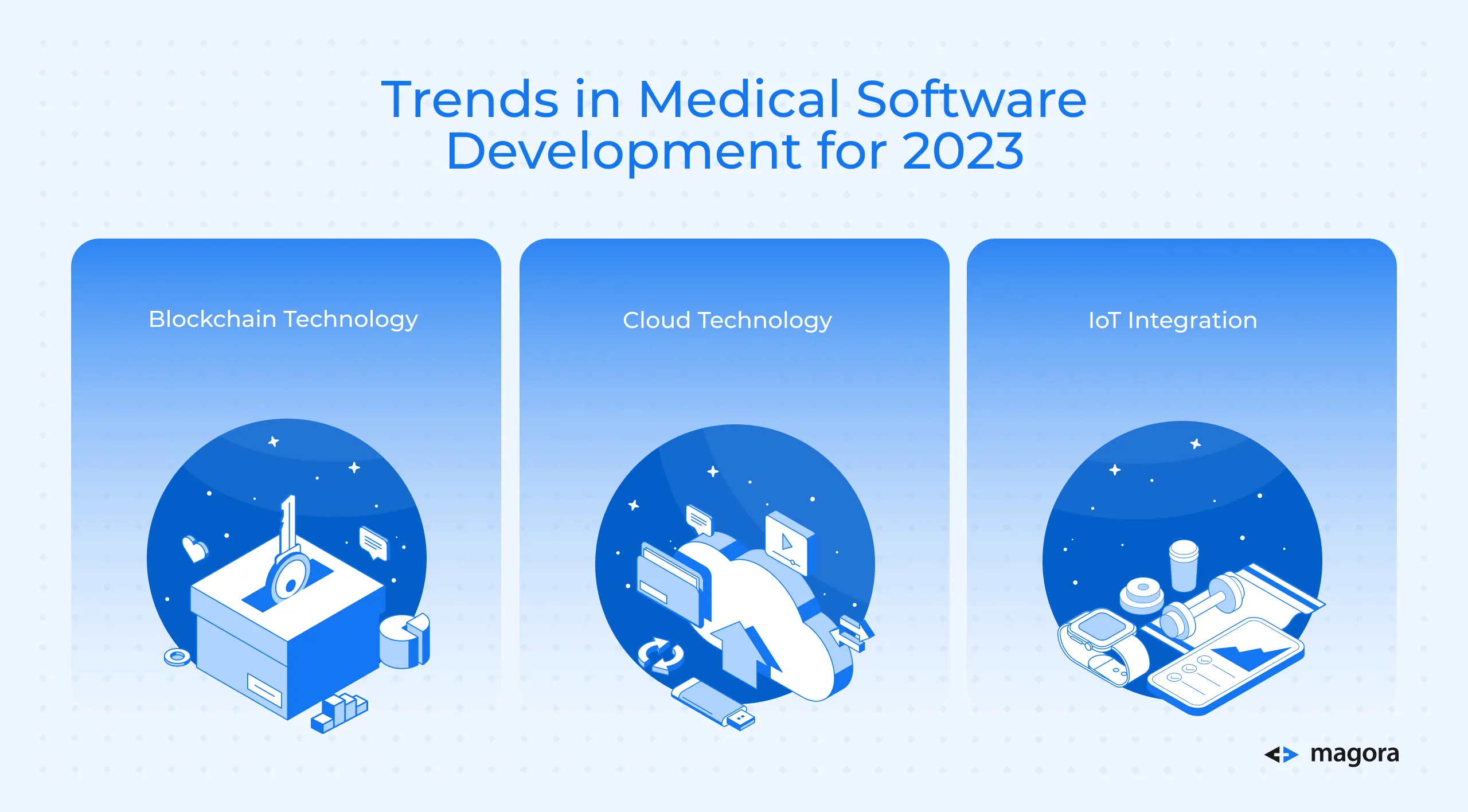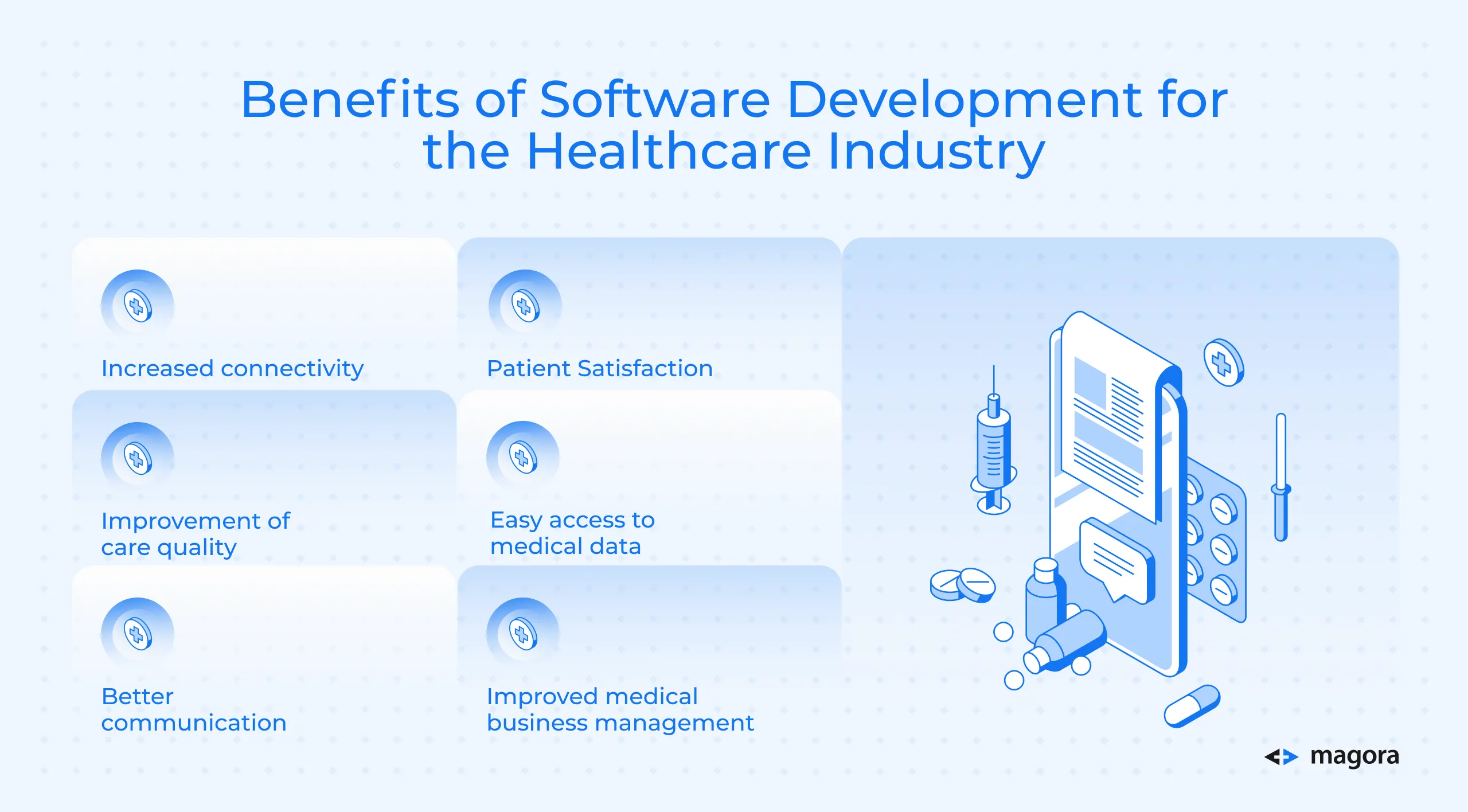
Healthcare Software Development Full Guide

Table of contents
- What is Healthcare Software Development
- Why Should You Build Healthcare Software?
- Types of Medical Software
- Custom Healthcare Software Development for Healthcare Professionals
- Trends in Medical Software Development for 2023
- Popular Examples of Healthcare Software Development
- Benefits of Software Development for the Healthcare Industry
- Process of Healthcare Software Development
- How Much Does It Cost to Develop Healthcare Software?
- How to Choose a Decent Healthcare Software Development Company
- Cost estimation at Magora and Case Studies
- FAQ
- Conclusion
During the last years, the global healthcare IT industry has grown, which has provoked a great demand for healthcare software development. Constant technological achievements modernize the healthcare system in general and change it for better patient care. Medical software development implies creating mobile or web apps for the medical community and patients alike. Magora provides services in software development that perform many essential functions, including communication with patients, gathering and processing data, and an interoperable system of personal health data. Healthcare software development with high frequency is fueled by many different factors, beginning with growing internet penetration and ending with lockdown consequences. The sweet comes with the bitter: an explanation of how strongly COVID-19 triggered the technological acceleration of healthcare software solutions. Still, there are medical companies and organizations that have a low level of adaptability to the new working systems with advanced software solutions.
What is Healthcare Software Development
Software solutions for the healthcare industry address a wide range of issues and challenges inside and beyond the healthcare system, in particular interactions with patients. Digital technologies in the medical sphere have already been put to good use in research activities, medical equipment development, and financial aspects. Today, it is possible to supply accurate, fast, and qualitative assistance due to the building of a single, interconnected healthcare system by means of system software development. We all know how much all the clinical manipulations cost, and the rigidity of the healthcare system aggravates the situation even more. One of the priority goals of the healthcare software development companies is to streamline the financial processes and, in doing so, increase healthcare cost efficiency. Such development companies win customers’ love and outperform competitors by meeting the objectives and quality of the work. If there are effective tools implemented in the developed software to analyze and extract information from big data, manage financial issues, and increase customer loyalty, then your investments have paid off. At Magora, we offer end-to-end development and consulting healthcare IT solutions for the digital transformation of the healthcare system and use modern technologies and services to “plug all leaks”of the system.
Why Should You Build Healthcare Software?
One of the thorniest problems in the healthcare industry was the lack of collaboration among providers during the patient care process. This led to negative client experiences, a mess in the documentation, and rising costs. A strategic plan includes complex and long-term actions with a deep understanding of the root problem. With the opportunities that healthcare software gives to the industry, it is possible to improve the situation by broadening compliance standard usage, and ensuring a secure transfer of personal data between providers and third parties, giving access to only those who are eligible. The technologies are constructed in such a way that they totally ensure secure connections for confidential personal data protection and usage. All modern software is developed according to the HIPAA, GDPR, DPA, and DIGA regulations. Thanks to the EMR systems, patient care benefits in such areas as care coordination, personal profile exchange, and easy access to complete, up-to-date data. As a result, the speed and accuracy of correct diagnoses increase, and healthcare providers’ paperwork time is reduced. With the help of healthcare software development, a unified drug database has also been established where important drug information is gathered. Medical professionals and patients can check their drug compatibility. Moreover, prescriptions for medicines are sent directly from physicians to pharmacies, and bills from healthcare providers go directly to insurance companies. Having healthcare software on smartphones gives instant access to the results of laboratory testing and, if needed, the ability to do a self-check of heart rate, blood pressure, and other body indicators. The more medical professionals have helpful and accurate data about our state of health, the faster it is possible to intervene if the disease develops.
Types of Medical Software
Appointment management and booking system
The system’s primary aim speaks for itself—the hospital management software helps arrange the process of doctor’s scheduling in the most comfortable and transparent way for all sides. It may also include payment services.
Medical billing software
Medical billing software structures an organization's financial flows, operates with medical insurance companies, and keeps records of all transactions.
Laboratory Information Management System
LIMS records and works with the information that comes from laboratory manipulations, the results of experiments, and instrument sensors. It boosts data processing and results in high efficiency.
Operating Theatre Management System
OTMS keeps data about all necessary tools and items during surgery and their availability and condition. The system permits to obtain an patient’s electronic consent or of the relatives. The data concerning preoperative and postoperative conditions is also kept in the OTMS.
Patient Administration System (PAS)
Patient Administration Systems (PAS) are a type of software created to improve administrative workflow and automate routine tasks.

Custom Healthcare Software Development for Healthcare Professionals
As you noticed, there is a wide range of options for using healthcare software on a daily basis among healthcare providers and patients. Custom healthcare software development meets the needs of a narrow audience or solves specific kinds of problems. In this case, healthcare software development companies create tailored solutions on the basis of a client’s special requirements. Custom software is built from scratch and requires a focused approach to suit an organization's particular needs. At Magora, we appreciate an individual approach that guarantees unique results.
Trends in Medical Software Development for 2023
Blockchain Technology
Blockchain technology is a decentralized, advanced data warehouse used for recording transactions, enabling transparent data exchange and the ability to track the history of the record. The essence of blockchain is the key that might solve healthcare system problems. The fact that blockchain is immutable and distributed makes it store confidential information securely, as nobody can change the record. Another advantage of blockchain is that transaction costs are cut as the need for inspection bodies, such as middlemen banks, is eliminated.
Cloud Technology
Cloud technology in the healthcare industry provides healthcare professionals with remote access to their work places. Via laptops, smartphones, or other devices, doctors and nurses remain effectively incorporated into the workflow. Cloud computing can be used in telehealth software development, enabling healthcare professionals to consult patients from anywhere, saving time for both of them. In addition, it makes physicians work more collaboratively as they see the previous patient’s experience and the medical history overall.
IoT Integration
The implementation of the IoT (Internet of Things) is an essential part of healthcare system improvements and requires relevant healthcare software development. Regular tracking of vital indicators with smart watches or fitness trackers has become a habit for more and more people, which fuels the growing IoMT (Internet of Medical Things) trend. The collected statistics can be useful at a doctor's appointment. The global IoT market size is expected to grow from £384 billion in 2022 to £1,190 billion by 2029, at a CAGR of 26.4%. In the next few years, investment flow in the Medical Internet of Things industry will only increase and push the market.

Popular Examples of Healthcare Software Development
Telemedicine software
During the lockdowns, we learned to communicate with medical providers remotely via the web or mobile apps and quickly adapted to the new reality. Today, even if we have the opportunity for face-to-face appointments, some patients would still prefer online consultations. The healthcare system needed such changes, and during COVID-19, this could be seen with the naked eye. Both doctors and patients with pleasure use multiple telemedicine apps that provide more features, such as payments and file sharing, besides video calling.
Healthcare CRM Software
Healthcare customer relationship management (CRM) software is a comprehensive system for gathering, collecting, and analyzing all necessary data about customers in order to build solid relationships. Based on this data, strategies on how to increase sales, enhance client service, or optimize marketing are created. Automated notifications about appointments are a great way of keeping customers engaged. Generally, the main aim of the CRM software is to organize all administrative tasks and get rid of routine work.
Remote patient monitoring (RPM)
Remote patient monitoring (RPM) is software for monitoring patient vital indicators beyond healthcare centers and hospitals. As a result, medical professionals receive more accurate information about a patient's condition, and sometimes that is enough for a remote diagnosis and the creation of a treatment plan. Such software helps instantly react to any incident that sensors record. RPM picked up steam as telemedicine during the lockdown. RPM allows doctors to track such measurements as heart rate, blood pressure, glucose, and oxygen levels.
E-prescription software
E-prescription software extends the usage of ordinary prescription procedures by adding the opportunity to view the history of previous medications, repeat or cancel them. The software sends the prescription list directly to pharmacies. E-prescription software is regulated by standards and may vary according to the country it was developed for.
Benefits of Software Development for the Healthcare Industry
Healthcare software development improves the whole industry and benefits all parties involved: patients, medical providers, and insurance companies. Let’s go down the list and check the patients’ benefits first.
Increased connectivity
Thanks to healthcare apps and web apps, it is much easier to reach relevant specialists via instant messaging, video and audio calls and get the necessary information in minutes. Your doctor is always there for you.
Improvement of care quality
Decreased workload of documentation and easy access allowed medical personnel to channel their energy toward qualitative transformation of care delivery. Healthcare software provides flexible solutions that make the working process convenient and smooth. Satisfied employees demonstrate a better attitude toward patients.
Better communication
Medical services become closer to patients. With the help of healthcare software, they can chat with medical professionals, make voice or video calls, receive laboratory results, and schedule appointments.
Easy access to medical data
The healthcare software simplifies obtaining data and its exchange with patients. With special software, they are able to have a detailed medical history in digital form. Then the information can be downloaded or shared with approved medical organizations. A list of drugs, laboratory results, and treatment programs with a list of medical procedures is always at hand on your smartphone. A lot of learning materials and interesting facts are included in the app's topical news section to boost patients' involvement in the care process.
Now we switch sides and look at the benefits for healthcare organizations.
Improved medical business management
Embracing digital transformations, the healthcare system is advancing in organizations’ productivity and administration issues. Medical billing technologies, simple personal data manipulations, and online medical practices translate into high financial performance, cost-effectiveness, and throughput capacity.
Patient Satisfaction
The current healthcare system has turned to a patient-oriented model, and one of the main goals (healing remains the highest priority) is to achieve clients’ satisfaction. Creating a favorable environment affects patients’ dispositions. People are more willing to receive healthcare services and are ready to recommend them to friends. This helps maintain the level of trust and loyalty.

Process of Healthcare Software Development
Step 1: Establish Requirements and Expectations
To start, it is necessary to form a full picture of the future product. For this, you need to take stock of all market conditions, competitive edges, and stakeholders' visions. The next step is to build a detailed plan with specific directions and goals, full software functionality, and cost estimates. It is important to discuss deadlines and potential pitfalls. At the end of the discovery phase, what we call this stage at Magora, you will have the answers to a list of questions that clarify the way forward.
- What product are we developing?
- What is the purpose of the product?
- How will it differ from the others?
- What key functionality do we want or need?
Step 2: UI Design
People always try to surround themselves with beauty and won’t use the app if they have more appealing alternatives. That is why it is critical to pay enough attention to customers' interaction with the software. It should be built in a logical way, have an intuitive nature, be attractive, and be easy to use for people of all ages. It must be taken into account that medical staff use a lot of desktop computers, and the software should perfectly fit their screens as well as smartphones’.
Step 3: Risk Evaluation
Nothing ventured, nothing gained. Business is always accompanied by risky moments, but it is possible to be prepared for them and ride out the storm with a clear mind and a plan for every case. Healthcare software development might be a winding road, and risk assessment will determine and rank potential risks and estimate all types of risks, including financial, management, and operational. We provide qualitative and quantitative risk assessment to provide an objective and informative outlook.
Step 4: Coding and Testing
This stage of healthcare software development includes programmers, specialized experts, and quality assurance engineers to create reliable working solutions. Programmers write code on the basis of functionality needs and by observing design requirements. Quality assurance engineers check the system for meeting the objectives. Testers are in charge of running multiple testing cycles to make the software error-free. Subject matter experts control the whole development process, providing the needed expertise and guidance.
Step 5: Deployment and Training
Finally, when the software has gone through thorough checks, it is ready to be presented to the audience. To get the most out of the new software, it is necessary to instruct users on how to use it properly. Such procedures allow us to be confident in the correct operation of the system and get instant feedback on the user experience.
How Much Does It Cost to Develop Healthcare Software?
There are many aspects that form the final price of healthcare software development. That is why it is so challenging to tell the exact proper sum of money. It can fluctuate depending on the time needed for the whole development process, the cost of one hour work, number of staff members, and the type of the software. The more intricate the work is planned to be, the higher the price is. The lower limit for the price of a decent software development is at the level of £40,000, and the upper threshold can soar upwards to £400,000. We recommend you to reach us and receive a cost estimation plan for your future project accompanied by our advice and professional expertise. We offer you to start with developing an MVP version of your product in order to be sure that you software will be accepted with open arms and spend minimum resources.
How to Choose a Decent Healthcare Software Development Company
If you have decided to outsource healthcare software development to a third-party company, you should pay attention to the key points that highlight a reliable and advanced healthcare software development company to build a fruitful cooperation. On the positive side of such companies could be their profound experience in software creation, as they are able to provide you with the required expertise, technology stack, and a well-coordinated team of experts. Choose the company that already has healthcare projects, as the company understands the market needs and the industry standards. Study the solutions they have created, and you may download and test their software. Tech-savvy companies have the technical equipment and skills to lead your project to success, avoiding all the traps. Secondly, a company's values are the factors that should be considered. Your partnership will be stronger if you have shared values and the same working approach. Otherwise, you may face a radical difference in opinion that will wreck the project. Additionally, check the company’s ratings and reviews on special platforms such as Clutch.
Cost estimation at Magora and Case Studies
InnovoCare is our solution to estimating the real costs of the services rendered in medical centers. This app clearly demonstrates every step of the patient’s care process and finally sums up all the expenses from the very first step—diagnosis—to the recovery stage. In order to execute the client’s plan, we implemented his idea of the dynamic tree technology (d3.js tree diagram) into reality. The project had several investors providing funding that was waiting for the app’s release. We started with building a prototype because it was of high importance to the client, even though it took additional resources. The InnovoCare app gives the company’s management insights into ROI calculations for any period of time. The app’s working principles can be transferred to projects in other industries. InnovoCare's success could happen again and help improve businesses that are far from the medical sphere.
FAQ
What should I consider when choosing a company for healthcare software development projects?
The healthcare software development company influences a lot of the whole creation process. The right one can bring it to success; another can wreck it. The final result lies in the hands of the chosen developers, so approach the search for your team carefully. Look at the experience of the company in the healthcare sphere. Check the pricing and real customers’ reviews. Contact the company in case they provide an advisory service and find out what they can offer for exactly your project.
How do I calculate the accurate cost of the development project?
There are several factors that influence the cost of the healthcare software development project. The first one is the type of software and its complexity. Whether it will be an app or a web app, what platform it will work on, etc. The second factor concerns your development team, its location, experience, and hourly rates. Tell us about your project, and we will perform all calculations per day based on the details of your project and our analytics.
Conclusion
One of the next key trends in the healthcare system, in the opinion of Deloitte, is the orientation towards preventive measures, early diagnosis, and prophylaxis, which outpace the development of diseases. From this perspective, healthcare IT solutions accelerate the development of this field and expand the possibilities for seamless interaction between patients and medical providers. Thereby, patients’ increased credibility and the effective operation of medical centers were ensured. Healthcare software development steps up efforts towards patient–centric approaches, and patient portals play a huge role in it as they allow patients to monitor treatment outcomes, choose the best variant of treatment plans, and be constantly in touch with healthcare professionals. A value-based healthcare system positively impacts business practices, improves reputation, and builds effective brand management.
At Magora, we keep abreast of the software development trends in the healthcare industry and offer our customers the latest technologies and provide healthcare app development for their needs. We are ready to create software for online consultations and remote communication with physicians, using blockchain technologies to make transactions more secure and less expensive. We can move your business to the digital world by creating EMR software boosted with AI to increase effectiveness and build a convenient workplace. Even though there are excellent prospects for the future of the healthcare industry, there are also a number of challenges to overcome. For example, software must adhere to healthcare standards and high security requirements, as vulnerable data is always under threat of attack by cybercriminals. But with Magora, it is important to know that all issues will be resolved.





